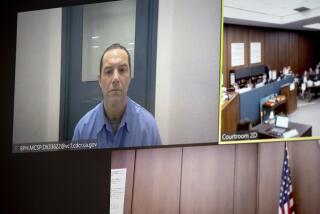Former Los Angeles County prosecutor challenges God in his new book
As a prosecutor, Vincent Bugliosi put Charles Manson behind bars. As an author, he outlined legal cases against O.J. Simpson, Lee Harvey Oswald and George W. Bush.
It turns out that Bugliosi was just warming up. Now the author of “Helter Skelter: The True Story of the Manson Murders,” has written a book that takes on God.
In “Divinity of Doubt: The God Question” (Vanguard Press), the former Los Angeles County deputy district attorney has applied his ample prosecutorial skills to the ultimate mystery: Is there a God and, if so, why does He allow evil?
“God cannot be all-good, all-powerful and all-knowing at the same time,” Bugliosi concludes. “These are irreconcilable virtues in a world overflowing with the bloody crops of evil.”
There is nothing new in Bugliosi’s formulation, which dates at least to the days of the ancient Greeks. What makes it interesting is the courtroom zeal he brings to the subject and the fact that he approaches it from the point of view of an agnostic, someone who believes it is impossible to know whether God exists.
Bugliosi is quite certain that God doesn’t answer our prayers (“For the life of me, I still don’t understand why humans pray”). But he has a sinking suspicion that he might be the cause of bad parking karma.
Atheists have grabbed public attention in recent years. Debate has swirled around best-selling books by Christopher Hitchens and Richard Dawkins, among others. Books by agnostics are in shorter supply, although Bugliosi does face competition from bestselling author and religious scholar Bart D. Ehrman, who has written “God’s Problem: How the Bible Fails to Answer Our Most Important Question — Why We Suffer” (HarperOne).
The question posed by Ehrman is at the crux of Bugliosi’s book as well, and perhaps the most difficult question confronting the faithful—indeed, confronting humankind. Bugliosi quotes 14-year-old Rutka Laskier: “If God existed, He would have certainly not permitted that human beings be thrown alive into furnaces, and the heads of little toddlers be smashed with butts of guns or be shoved into sacks and gassed to death.” (Bugliosi misattributed the quote to Anne Frank, to whom Rutka has been compared. Rutka died in Auschwitz in December 1943.)
Bugliosi adds that “according to Christianity, God, being all-powerful, could have stopped all of this. But he apparently decided it was just fine with him.”
In an interview at his home in Pasadena, Bugliosi said he decided to write the book after seeing how readers reacted to a short section in his book on the Simpson case, in which he asked how God could have allowed Nicole Simpson and Ronald Goldman to die and to “permit the person who murdered [them] to go free.” He concluded: “I, for one, can’t be sure at all there is a God.”
Hundreds of people wrote him about that section, he said, many wanting to save his soul. His reaction was to dig deeper into the subject.
Christian theologians, among others, have formulated various theories to explain why there is evil and why terrible things happen to apparently good people. None satisfies Bugliosi.
“If Christians want to have their God, that’s fine,” the former prosecutor said. “But if they have any respect for logic, they’re going to have to redefine him.”
No one could reasonably accuse Bugliosi of lacking esteem for logic. His is the cool rationality of the law, a world defined by fact, not faith.
“If I’m going to heaven, I want to take my reason with me,” he said. Of course, he doesn’t believe in heaven.
He also doesn’t like art, and he can’t bear fiction because “I know it never happened.”
Bugliosi, 76, wrote his latest book, as he has all his previous ones, with pen on yellow legal pad. He does not own a computer or cellphone and employs the quaintly old-fashioned research technique of reading books in a library. He did not speak to any theologians, he said. He saw no need.
“I am able to evaluate evidence,” he said. “This is not something that requires interpretation. It’s black and white.”
The faithful take a beating in Bugliosi’s book, but he doesn’t spare atheists either.
“When I hear theists and atheists pontificating on how they know God does or does not exist, I can only smile at the irrationality and, yes, vanity of the notion,” he writes.
Bugliosi believes that atheists have failed to account for the “first cause” argument for God’s existence — that someone or something created the universe. “We know from our human experience that nothing in existence can give itself existence because if it did, then it would have to have preceded itself, an impossibility,” he writes.
So God might exist, but not the Christian God — of that, he’s sure. “If you’re deeply religious,” he said, “this isn’t a book for you.”
mitchell.landsberg@latimes.com
More to Read
Start your day right
Sign up for Essential California for news, features and recommendations from the L.A. Times and beyond in your inbox six days a week.
You may occasionally receive promotional content from the Los Angeles Times.






